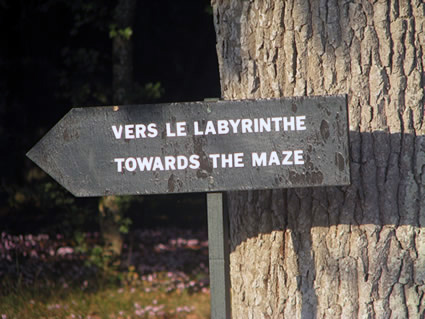Travel: A Lifelong Journey of Learning
Article by Dr. Jessie Voigts
Wandering Educator Contributing Editor for TransitionsAbroad.com

|
|
A sign pointing to a maze at
the incredible Chateau
de Chenonceau in the Loire, France. Photo ©Gregory
Hubbs.
|
Remember that first time you were confronted
with extreme difference? It might have been
when you were small, surrounded by a cacophony of words
in a different language, or while you were a teen, backpacking
Europe and trying to figure out the train systems. It
might have been driving on the opposite side of the road,
or eating foods that are unusual (grasshoppers, perchance?).
Now think hard – what was your reaction? Did you revel
in the difference, rise to the challenge, and become
addicted to the joy of exploring the unknown?
If you’re reading Transitions Abroad,
you’re in the club. Those that love exploring the world,
that see life – and travel – as a long journey of learning,
those that find joy in the unexpected, the challenges of
difference, the happiness of homecoming.
And yet…travel has changed
a great deal in our lifetimes. Depending on
your age, it has gone from travel for the elite to travel
for the masses; from lugging thick, dog-eared guidebooks
to quickly downloading apps; from asking friends for
advice to asking the world. With the whole world open
to us, and travel easier than ever, how can modern
travelers find what they desire? And how
has learning about the world changed, with the
advent of the internet and 24/7 global knowledge?
I have long posited that education
is global, and that travel is an essential part
of lifelong learning. If you’re lucky, your family starts
traveling while you’re young, so that it is an integral
part of life and learning. Others have to wait until
opportunities present themselves – gap years, study abroad
programs, international internships, and volunteering
overseas are all excellent ways for young adults
to experience the joy of travel and being in the world.
Then they, too, get bit by the discovery and culture
bug, and travel as frequently as they can, often becoming
global nomads in this digital age.
For that is the essence of
travel today – the ability to be elsewhere quickly,
the abundance of first-hand knowledge on the internet,
which leads to the ability to learn about the world in
a variety of ways. Travel is all local,
in a way – one can always find insider tips from someone
that has been there, anywhere in the world, even a remote
island populated by only a dozen people. Because of the
digital economy, our neighbors and coworkers are global.
Our friends and family are easily accessible by Skype
from anywhere in the world; the only challenges are figuring
out time zones and grabbing a steady Wi-Fi connection.
But (and there is always a but) how
do you sift through the infinite resources on
travel, locations, people, cultures, languages, food,
adapting to difference, being culturally sensitive?
For the information is never-ending,
and more is being added each day. Critical thinking
skills are a must, to discern reality from braggadocio,
to find intercultural tips instead of diaries.
Learning from experts is important,
as well – it’s one thing to read of someone’s experiences,
another to read the experiences of someone who has thoughtfully
embraced lifelong learning and travel. For that
is the difference – the thinking traveler is one
who works toward ethnorelativism, who wants to truly experience
a culture, who steps out of their comfort zone and embraces
that extreme difference. It doesn’t mean that they have
the perfect journey – far from it. Rather, the smart traveler
knows that life is messy, travel is messy, people are messy
– and revels in the entire experience, the good and the
bad, learning along the way. The basics? Travel, flexibility,
a sense of humor, and an open mind.
Does this sort of travel come naturally
to some? Perhaps. It can also be learned, which is where
I find my place – educating about ways to learn from the
world, move toward ethnorelativism, write and share and
honor the work of amazing people from around the world.
On our website, Wandering
Educators, we share the best of travel experiences from
people all around the world. The common factors? An eagerness
to learn from others, the view that travel is the journey,
and that education and travel go hand in hand. I also run
our Youth
Travel Blogging Mentorship Program, where we teach teens
all the aspects of travel writing and travel blogging they
need to succeed – including ones not covered in traditional
travel writing/blogging course: intercultural learning,
how to find the unique, how to find what they love. By inspiring
intelligent travel this young, and sharing the best of smart
travelers’ passions, I hope to help shape the worldviews
of global citizens, truly committed to travel as a lifelong
journey of learning.
Dr.
Jessie Voigts is the publisher of Wandering
Educators, a travel library for people curious
about the world. She’s published
six books about travel and intercultural learning,
with more on the way. You can usually find her family
by water — anywhere in the world.
|
